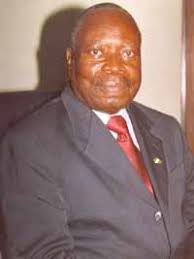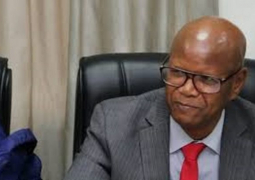
My Lord Chief Justice
My Lords
Hon. Attorney General & Minister of Justice
President of The Gambia Bar Association
Colleagues and Friends
“In December 1983 barely eleven months after his appointment as Chief Justice of The Gambia, I, as Attorney General & Minister of Justice, made certain observations about The HonourableMr Justice Ayoola contained in a speech I delivered on the occasion of the opening of Supreme Court Number 3.”
This is now included in one of my recently published books, In the Service of My Beliefs,on pages 126 – 127. This is what I had said on that occasion and repeat it here as a tribute to his memory.
“Up to the appointment of His Lordship, the HonourableMr Justice Emanuel Olayinka Ayoola, as Chief Justice of The Gambia, there was a real danger of the administration of Justice collapsing by default. We all know that these buildings, constituting the entire Supreme Court, were put up as private residences some one and a half centuries ago. We are also not unaware that these buildings are made up of white lime and laterite bolder stones and rafters, but no cement. The buildings in which the Gambia Magistracy sit are even worse. Indeed, all or most of the courthouses in use have been makeshift improvisations of former colonial administration bungalows, offices, cinemas or police stations until 1977 when Mr A.A.B Gaye, (Principal Magistrate as he then was) put a stop to the practice of the trial of criminal cases which used to be held inside the Barra Police post, and after that in the open, under a tree. At Farefenni, criminal cases were tried at a Cinema Hall. At Brikama, this is still being done at the annex to the commissioner’s Office. The Banjul Magistrates’ Court is in one of the noisiest parts of the city. The whole situation gets worse as one goes further up in the country”.
“Secondly, the fundamental assistance that an advocate, a magistrate, or even a Judge needs is access to a good Law Library. Law Reports, Statutes and legal periodicals are the tools of our trade. Not a single Magistrates’ Court can boast of even a full and complete set of the Laws of The Gambia. The only library in the Judiciary is that of the Supreme Court. It is not a complete law library and only provides little assistance to Courts outside Banjul”.
“Within the severe economic constraints of limited resources already overstretched by the national reconstruction programme, our hopelessness was compounded by the equally urgent need to increase the personnel of the judiciary if we were ever going back to 1975 and coping with the increase in litigation.”
“In the Provinces where the vast majority of the people live, there was only one unqualified Second Class Magistrate covering the North Bank Division and Lower River Division, all by himself. The Western Division could not even get the benefit of a Travelling Magistrate.”
“This was the desperate situation of the Judiciary when His Lordship Chief Justice Ayoola assumed the headship of our judicial arm of government. Appreciating that Magistrates and Magistrates’ Courts are the Courts of first instance and that the standards of the Courts of first instances are the standards of law in any country, and that it is by these standards that the law is judged, Chief Justice Ayoolaand I as Attorney General and Minister of Justice, were uncompromising in our demands for greater improvement.”
“We sought and obtained two new landrovers for our Magistrates in the Provinces. There is now an experienced, qualified Magistrate at Kanifing and another sitting daily at Brikama. The Mansakonko Magistrates’ Court has been completed, and there is now a Resident Magistrate at Basse, where a new Magistrates’ Court, will be completed before the end of the year.”
“A Law Reporting Committee has been constituted. It has already started work, and it is hoped and expected that the first edition of the first Gambia Law Reports will also be out before the end of the legal year. There have also been great improvements in terms of personnel and the provision of better facilities in the Supreme Court. I do not doubt that this new Court Room will greatly assist in our untiring efforts to alleviate that heavy backlog of cases in these Courts in particular and towards improving the administration of justice in general.”
“For all these, I now ask you to join me in paying special tribute to His Lordship Chief Justice Ayoola for his inspiring leadership of the judiciary and to all those who, in one way or another, assisted us in every way towards this tremendous improvement.”
“That was ten years ago as Chief Justice. Isn’t that remarkable? But even more impressive have been his leadership and great achievements in steering the judicial arm of government and this country's legal profession for the past 10years. Mr S B S Janneh has mentioned some of these achievements. I will only make a passing reference to some of the others. I start with the Supreme Court.”
“At the time Chief Justice Ayoola started his leadership of the Judiciary, there were only two Courtrooms in the Supreme Court. Now there are five and all within the same building. Ten years ago there were at most two Judges and invariably only one Judge, the Chief Justice himself. Now, there are five, and for the first time in the history of this country, a full complement of Judges in the Supreme Court. There is also a magnificent new Supreme Court Building waiting to be inaugurated and the panacea to the age-old problems of accommodation in our Courts. And that is not all. Also, for the first time in the country's history, we now have not only Magistrates’ Courts but also Resident Magistrates in all the five administrative divisions of The Gambia. It was only upon the establishment of The Gambia Law Foundation, which was initiated, inspired and chaired by Chief Justice Ayoola and I, that this Jurisdiction became the venue of, and in particular, the legal profession seminars, workshops and judicial conferences this country has ever seen. Singlehandedly, he compiled, edited and published the first Gambia Law Reports. The great strides Chief Justice Ayoola has made for the development and the enrichment of justice in the jurisdiction are legendary, and far too many to enumerate.”
“It would, however, be wholly unjust to ascribe all of these changes to The Hon. Chief Justice Ayoola, who is now at last about to leave this jurisdiction and return to his country. But it would be equally wrong in his presence, and this company not to acknowledge the vast debt which this country and especially the entire legal profession owe to his deep leadership, his powerful legal intellect, and even to his telling and pungent English style and to abandon my metaphor, for nearly a decade during which he presided over the Supreme Court of The Gambia.”
“Without him, things will never be quite the same again. But notwithstanding his departure from the Supreme Court, our period of creativity will not quite come to an end, with less relapse once more into quiescence. But, my Lord Chief Justice Emanuel Ayoola, we shall miss your passion for justice, your independence and quality of thought, your liberal mind, your geniality, your unfailing courtesy to colleagues, to Counsel, and to litigants in person who, like the poor, are always with us, particularly in the Supreme Court.”
“Above all, we shall miss you and your gift of friendship, your sturdy independence, and your unflagging and effervescent enthusiasm.”
“Now you are going, but here you see a company of admirers and friends around you. We wish you well. Come and see us often. Wherever lawyers are gathered together in this jurisdiction, we will always rejoice to see you in our midst. We thank you for a decade of great service to this country, to our profession, and to the cause of justice.”
May your soul rest in peace!




